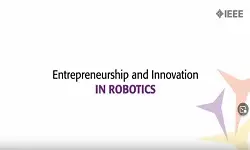-
Members: FreeRAS
IEEE Members: Free
Non-members: FreeLength: 00:28:41
31 May 2017
Video Description
Industry 4.0 is a confluence of trends and technologies pushed by the digital revolution and the “Internet of Things,” and driven by customer demand for high quality and customized products at reasonable prices. With (1) the ubiquitous connection and interaction of machines, things and people, (2) the mixing of physical and virtual worlds, and (3) the emerging of disruptive technologies such as 3D printing and robotics, the ways we design and manufacture products and provide services will be fundamentally changed. In this talk, Industry 4.0 will be introduced, including its design principles and key technologies. An important but difficult technology often missing in discussions - mathematical optimization, especially for problems involving discrete decision variables or for methods to coordinate distributed and autonomous “things,” will be highlighted. Applications to “Clean Energy Smart Manufacturing” will be presented, and implications on automation and robotics will be discussed. Finally, Industry 4.0 in the US, Europe, China and Japan will also be introduced.
ICRA 2017
The 2017 IEEE International Conference on Robotics and Automation (ICRA) was held from May 29 to June 3, 2017 at Sands Expo and Convention Centre, Marina Bay Sands in Singapore. ICRA is IEEE Robotics and Automation Society's flagship conference and is a premier international forum for robotics researchers to present their work. The conference theme, “Innovation, Entrepreneurship, and Real-world Solutions”, underscores the need for innovative R&D talent, dynamic and goal-driven entrepreneurs and practitioners using robotics and automation technology to solve challenging real-world problems such as shortage of labour, an ageing society, and creating sustainable environments.
Speaker
Peter B. Luh received his B.S. from National Taiwan University, M.S. from M.I.T., and Ph.D. from Harvard University. He has been with the University of Connecticut since 1980, and currently is the SNET Professor of Communications & Information Technologies. He is also a member of the Chair Professors Group, Center for Intelligent and Networked Systems (CFINS) in the Department of Automation, Tsinghua University, Beijing, China.
Professor Luh is a Fellow of IEEE, and a member of IEEE TAB Periodicals Committee. He was the VP of Publications of RAS (2008-2011), the founding Editor-in-Chief of the IEEE Transactions on Automation Science and Engineering (2003-2007), and the Editor-in-Chief of IEEE Transactions on Robotics and Automation (1999-2003). His research interests include intelligent manufacturing systems, smart power systems, and smart and green buildings. He received IEEE Robotics and Automation Society (RAS) 2013 Pioneer Award for his pioneering contributions to the development of near-optimal and efficient planning, scheduling, and coordination methodologies for manufacturing and power systems. He is the 2017 recipient of the RAS George Saridis Leadership Award for his exceptional vision and leadership in strengthening and advancing Automation in the RAS.
Industry 4.0 is a confluence of trends and technologies pushed by the digital revolution and the “Internet of Things,” and driven by customer demand for high quality and customized products at reasonable prices. With (1) the ubiquitous connection and interaction of machines, things and people, (2) the mixing of physical and virtual worlds, and (3) the emerging of disruptive technologies such as 3D printing and robotics, the ways we design and manufacture products and provide services will be fundamentally changed. In this talk, Industry 4.0 will be introduced, including its design principles and key technologies. An important but difficult technology often missing in discussions - mathematical optimization, especially for problems involving discrete decision variables or for methods to coordinate distributed and autonomous “things,” will be highlighted. Applications to “Clean Energy Smart Manufacturing” will be presented, and implications on automation and robotics will be discussed. Finally, Industry 4.0 in the US, Europe, China and Japan will also be introduced.
ICRA 2017
The 2017 IEEE International Conference on Robotics and Automation (ICRA) was held from May 29 to June 3, 2017 at Sands Expo and Convention Centre, Marina Bay Sands in Singapore. ICRA is IEEE Robotics and Automation Society's flagship conference and is a premier international forum for robotics researchers to present their work. The conference theme, “Innovation, Entrepreneurship, and Real-world Solutions”, underscores the need for innovative R&D talent, dynamic and goal-driven entrepreneurs and practitioners using robotics and automation technology to solve challenging real-world problems such as shortage of labour, an ageing society, and creating sustainable environments.
Speaker
Peter B. Luh received his B.S. from National Taiwan University, M.S. from M.I.T., and Ph.D. from Harvard University. He has been with the University of Connecticut since 1980, and currently is the SNET Professor of Communications & Information Technologies. He is also a member of the Chair Professors Group, Center for Intelligent and Networked Systems (CFINS) in the Department of Automation, Tsinghua University, Beijing, China.
Professor Luh is a Fellow of IEEE, and a member of IEEE TAB Periodicals Committee. He was the VP of Publications of RAS (2008-2011), the founding Editor-in-Chief of the IEEE Transactions on Automation Science and Engineering (2003-2007), and the Editor-in-Chief of IEEE Transactions on Robotics and Automation (1999-2003). His research interests include intelligent manufacturing systems, smart power systems, and smart and green buildings. He received IEEE Robotics and Automation Society (RAS) 2013 Pioneer Award for his pioneering contributions to the development of near-optimal and efficient planning, scheduling, and coordination methodologies for manufacturing and power systems. He is the 2017 recipient of the RAS George Saridis Leadership Award for his exceptional vision and leadership in strengthening and advancing Automation in the RAS.


